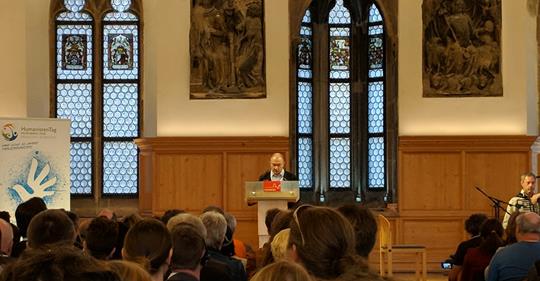
Feierliche Eröffnung des HumanistenTag
2018. Ansprache von Giulio Ercolessi, Präsident der EHF.
Opening ceremony of the 2018 German Humanist Day. Address speech by Giulio Ercolessi, EHF president.
Historischer
Rathaussaal, Nürnberg, 22.
Juni 2018
Ancient
Town Hall, Nuremberg, June 22nd
2018

Liebe Freunde, lieber Michael,
einige unserer
Vorstandsmitglieder erinnern
sich vielleicht, dass ich, als wir uns letzten November in Valencia
trafen und
die technischen Details unserer Generalversammlung hier in
Nürnberg diskutierten,
sagte, dass wir alle noch sechs Monate Zeit hätten, Deutsch zu
lernen. Da ich
mit wenig Erfolg versucht habe, mein sehr schlechtes Deutsch
aufzufrischen, möchte
ich zuerst unseren deutschen Mitgliedern, dem Humanistischen Verband
Deutschlands und dem Humanistischen Verband Bayern und insbesondere
Michael, in
ihrer Sprache dafür
danken, dass sie uns die
Möglichkeit gegeben haben, uns im Rahmen des Deutschen
Humanisten-Tages zu
treffen. Und das in dieser Stadt, die, nachdem sie von der Tyrannei zur
Hauptstadt gewählt wurde, jetzt eine der moralischen
Hauptstädte der
Bundesrepublik ist: Letzere ist, meiner Meinung nach, wahrscheinlich
das bestgeimpfte aller
unserer Länder, geimpft gegen die
totalitären Krankheiten, die wir bisher in den letzten siebzig
Jahren in Frieden und Freiheit verhindern konnten,
zumindest in diesem
Teil Europas. Und ich persönlich denke, wir sollten ihre
Institutionen als
Vorbild nehmen, als wir uns für ein besseres Europa einsetzen.
Aber damit ist
mein Deutsch leider fast komplett zu Ende: auch später, keine
Fragen auf
Deutsch, bitte.
I suppose that was enough of an effort, but I
have now to switch fast to
English.
We are altogether living bleak times in Europe
and throughout what used
to be called the Western world. Most of the taboos that were
established after
the end of WW2 in defence of our restored or newly established
democracies have
been broken and this has been largely accepted by public opinion and
electors.
If much of liberal democracy consists in “government by
discussion”, our public
discourse is growing more and more uncivilised. What has been proudly
defined
“illiberal democracy”, by one of the elected
authoritarian leaders of Europe,
is a model that is apparently gaining momentum in many of our
countries. The
most basic human rights are being trampled in many of our countries.
What in
the last seventy years used to be called, rightly or wrongly, the
leader of the
Western world, the USA, has surrendered to a tycoon who appears to be
totally
unaware of the basic principles of constitutional government and of the
rule of
law, beginning with international law.
Whatever the details and the legal, economical
and technical provisions,
each of us may prefer, we must do whatever we can to avoid the sinking
of our
civilization, of what most deserves of it to be preserved and handed
down to
the Europeans of the future: liberal democracy, secular institutions,
the rule
of law, human rights, government through rational discussion, freedom
of
belief, freedom of the media. In short, the heritage of the
Enlightenment.
At a time when the progress of scientific
research and its achievements
might theoretically open us the way to a global Golden Age, the
political and
cultural developments seem to move in an opposite direction, pushed by
the new
religious fundamentalism, by the autochthonous religious conservatives
that
seek to regain power and influence thanks to them, by populist and
nationalist
politicians and mass media that are, without even being aware, leading
our
civilization to the same road, opposite to integration, and opposite to
supranational democracy, that led to the two attempted suicides of
Europe in
the 20th century.
We should fight the populist and fundamentalist
narrative, restore
education to citizenship, fight the “barbarism of
specialisation” that is
disempowering even highly educated electors: all these forces and
phenomena are
pushing toward a downfall of our civilization, for reasons that are
utterly the
opposite of those outlined by the intellectuals that first used that
formula
one hundred years ago.
Yet, there are also positive signs. Along with
the steady growth of
societal secularisation, at least in Western Europe, traditional
authoritarianism appears no longer capable to reverse the trend towards
individual self-determination and individual freedom to choose. That
kind of
traditional authoritarianism based on religious prejudice may
unfortunately be
brandished as a rhetorical tool to stigmatise strangers or to
revitalise
nationalism, jingoism, xenophobia, even open racism, sexism and
homophobia. But
that kind of traditional authoritarianism cannot be realistically
re-imposed on
our citizens: the triumph in the Irish abortion referendum, three years
after
that on equal marriage rights, is there to show that impossibility. On
Lgbti
rights and end-of-life regulations our cultural battles are winning,
and there
is no sign of a reversion in the path towards individual
self-determination.
That is probably also the case or reproductive rights, and freedom to
choose,
even though we must be aware that the new narrative adopted by our
opponents,
that is now based on a distorted use of human rights and ecological or
animal
rights jargon, requires an updated response from us. And, when and where
it
retained its independence, the judiciary, and also most of our legal
culture,
are not reversing the basically slow but steady progressive trend of
the past
decades.
But even those achievements could be
jeopardised by a downfall in the
quality of our democracies. There is a huge disproportion between our
duties
and the resources we have at our disposal.
I would be insincere if I said that I am
satisfied with what we were
able to do in the past year, but with your help, with our small but
brilliant
and talented staff, we should redouble our efforts in the great
challenges we
are bound to face in the next year. This will be a crucial year,
because
Europe, of which the European Union is no minor political actor,
carries more
responsibility than ever in the defence of the tradition of the
ethical-political
values and of the legal principles of the Enlightenment and of its
civilisation, that is our own.
